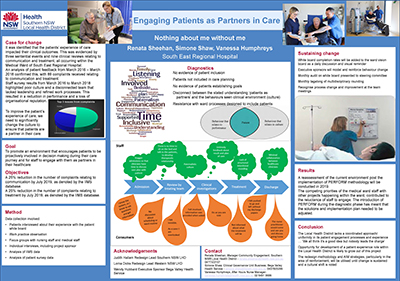This project brings together patients, families, carers and healthcare staff to act as partners in care and treatment planning.
View a poster from the Centre for Healthcare Redesign graduation, December 2018.
Aim
By July 2019 there will be a reduction of 25% in the number of complaints relating to communication and treatment within the medical ward of South East Regional Hospital (SERH).
Benefits
- Patients and families are empowered to drive care outcomes
- Reduced risk to patient safety
- Care is patient-centric and recognises the role of carers and families
- Improved results in experience based surveys of staff and patients
- Improved communication across healthcare teams
- Better collaboration in preparing for discharge
Background
The executive leadership team at SERH identified that the patients’ experience of care impacted their clinical outcomes. This was evidenced by three sentinel events and nine clinical reviews relating to communication and treatment. These occurred within the medical ward of SERH.
Feedback received from patients, families and carers indicated that communication, treatment and access (timely care) did not meet their expectations. Data (patient surveys) showed that patients were not actively involved in care planning. This resulted in 89 complaints directly related to communication, treatment, and access (timely care) between March 2016 and March 2018. The analysis of these complaints relating to communication, treatment, and access (timely care) was consistent with the previous data collected.
Your Say staff survey results for the same period (March 2016 to March 2018) highlighted poor staff culture and a disconnected team that lacked leadership and refined work processes. This led to impaired performance and a loss of organisational reputation.
Implementation
The project team will be implementing two solutions.
- The use of patient communication boards by staff and patients, families and carers to encourage communication and shared partnership in care
- Interdisciplinary team rounding at the bedside, where the patients, families and carers are key partners in the process. These routine ward processes were previously identified as being poorly executed and communications rarely included patients and families.
Both solutions will be co-designed and implemented with patients, families, carers, and staff. This includes co-designing key principles, establishing ways of working, education, and execution.
The project team collaborated with other ward project initiatives (including PwC’s PERFORM program) that were seen to have a common purpose. As a result the executive sponsor and project team re-evaluated the efficacy of the solutions and adjusted the implementation process and timetable accordingly.
Implementation has been adjusted to complement the PERFORM program. The patient communication board implementation will commence in February 2019, and completed and evaluated by April 2019. The interdisciplinary team rounding implementation will commence in March 2019, and will be completed and evaluated by June 2019.
Status
Implementation – The project is ready for implementation or is currently being implemented, piloted or tested.
Dates
Project Timeframe: February 2018 to June 2019.
| Solution 1: Patient information whiteboards - key milestones | |
|---|---|
| Project planning | 10 April 2018 |
| Diagnostics | 7 June 2018 |
| Solutions planning | 31 July 2018 |
| Redesigning the whiteboard layout using co-design principles | 15 Feb 2019 |
| Establish a standard and a way of working for the use of whiteboards that includes patient and families | 8 March 2019 |
| Implementation | 5 April 2019 |
| Evaluation | 24 April 2019 |
| Solution 2: Interdisciplinary rounding - key milestones | |
|---|---|
| Project planning | 10 April 2018 |
| Diagnostics | 7 June 2018 |
| Solutions planning | 31 July 2018 |
| Redesign the clinical team ward round to include interdisciplinary team, patients and families | 15 March 2019 |
| Establish a standard and a “way of working” for interdisciplinary rounding that includes patients and families | 12 April 2019 |
| Implementation | 26 April 2019 |
| Evaluation | 24 June 2019 |
Implementation sites
Medical ward of South East Regional Hospital.
Partnerships
Centre for Healthcare Redesign
Evaluation
The evaluation of both solutions will run from 5 April 2019 through to 24 June 2019.
Lessons learnt
- The competing priorities of the medical ward staff with other projects happening within the ward, contributed to the reluctance of staff to engage.
- The introduction of PERFORM during the diagnostic phase has meant that the solutions and implementation plan needed to be adjusted.
- The varied work schedules of the project team, without dedicated project time, caused unavoidable delay throughout the process. Having ongoing support for the project is imperative, never stop talking about it.
Further reading
- Braithwaite J, Herkes J, Ludlow K, et al. Association between organisational and workplace cultures, and patient outcomes: systematic review. BMJ Open. 2017:7(10);1-11.
- NSW Health. Multidisciplinary Ward Rounds. A Resource, Sydney: NSW Health; 2011.
- Sehgal NL, Green A, Vldyarthi AR, et al. Whiteboards as a communication tool in the hospital setting: A survey of practices and recommendations. Journal of hospital medicine. 2010:5(4);234-239.
- Walton V, Hogden AaGD. Ward rounds, participants, roles and perceptions: literature review. International Journal of Health Care Quality Assurance. 2016:29(4);364-379.
Contacts
Renata Sheehan
Manager Community Engagement
Southern NSW Local Health District
Phone: 0477 322 107
renata.sheehan@health.nsw.gov.au
Vanessa Humphreys
After Hours Nurse Manager
Southern NSW Local Health District
Phone: 02 6491 9999
Vanessa.Humphreys@health.nsw.gov.au
Simone Shaw
Clinical Governance Unit Business
Bega Valley Health Service
Southern NSW Local Health District
Phone: 0437 605 299
simone.shaw@health.nsw.gov.au
